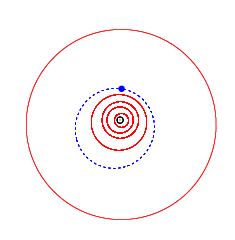9927 Tyutchev
|
| |||||||||||||
| Discovery | |||||||||||||
|---|---|---|---|---|---|---|---|---|---|---|---|---|---|
| Discovered by | L. G. Karachkina | ||||||||||||
| Discovery date | 3 October 1981 | ||||||||||||
| Designations | |||||||||||||
| MPC designation | 9927 Tyutchev | ||||||||||||
Named after | Fyodor Tyutchev | ||||||||||||
| 1981 TW1, 1981 UA1, 1981 UG10, 1991 XP | |||||||||||||
| Orbital characteristics[1] | |||||||||||||
| Epoch 13 January 2016 (JD 2457400.5) | |||||||||||||
| Uncertainty parameter 0 | |||||||||||||
| Observation arc | 12582 days (34.45 yr) | ||||||||||||
| Aphelion | 2.7568949 AU (412.42561 Gm) | ||||||||||||
| Perihelion | 1.6772087 AU (250.90685 Gm) | ||||||||||||
| 2.2170518 AU (331.66623 Gm) | |||||||||||||
| Eccentricity | 0.2434959 | ||||||||||||
| 3.30 yr (1205.8 d) | |||||||||||||
| 175.17429° | |||||||||||||
| 0° 17m 54.838s / day | |||||||||||||
| Inclination | 6.029754° | ||||||||||||
| 238.00713° | |||||||||||||
| 89.653574° | |||||||||||||
| Earth MOID | 0.677761 AU (101.3916 Gm) | ||||||||||||
| Jupiter MOID | 2.61531 AU (391.245 Gm) | ||||||||||||
| Jupiter Tisserand parameter | 3.606 | ||||||||||||
| Physical characteristics | |||||||||||||
| Dimensions | ~12.9 km[2] | ||||||||||||
| ~0.01 | |||||||||||||
| |||||||||||||
| 14.3 | |||||||||||||
|
| |||||||||||||
9927 Tyutchev is a main belt asteroid. It orbits the Sun once every 3.30 years.[1]
Discovered on October 3, 1981 by Lyudmila Karachkina at the Crimean Astrophysical Observatory, it was given the provisional designation "1981 TW1". It was later renamed "Tyutchev" after the Russian poet Fyodor Ivanovich Tyutchev.[3]
References
- 1 2 "9927 Tyutchev (1981 TW1)". JPL Small-Body Database. NASA/Jet Propulsion Laboratory. Retrieved 13 April 2016.
- ↑ Tedesco E.F.; Noah P.V.; Noah M.; Price S.D. "The supplemental IRAS minor planet survey (SIMPS)".
- ↑ MPC 34632 Minor Planet Center
External links
This article is issued from Wikipedia - version of the 9/10/2016. The text is available under the Creative Commons Attribution/Share Alike but additional terms may apply for the media files.
